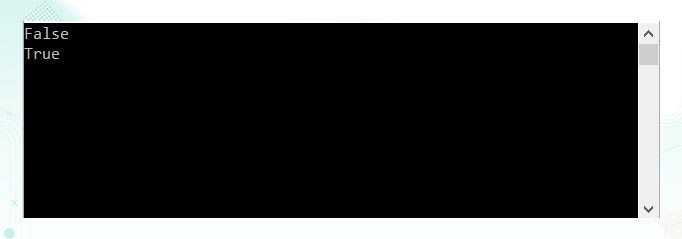
C# Comparison operators
Comparison operators (C# Relational Operators) are used to compare two values (or variables). This is important in programming, because it helps us to find answers and make decisions.
The return value of a comparison is either True or False. These values are known as Boolean values, and you will learn more about them in the Booleans chapter.
The equality and comparison operators, ==, !=, <, >, >=, and <=, work for all numeric types.
== and != test for equality and inequality of any type, return a bool value.
When using == on Value types, it compares the actual value:
int x = 3;
int y = 5;
int z = 3;
Console.WriteLine (x == y); // False
Console.WriteLine (x == z); // TrueIn the following example, we use the greater than operator (>) to find out if 8 is greater than 5:
int x = 8;
int y = 5;
Console.WriteLine(x > y); // returns True because 8 is greater than 5A list of all C# comparison operators:
| Operator | Name | Example |
|---|---|---|
== | Equal to | x == y |
!= | Not equal | x != y |
> | Greater than | x > y |
< | Less than | x < y |
>= | Greater than or equal to | x >= y |
<= | Less than or equal to | x <= y |
C# comparison operators - Description:
==: Returnstrueif operands are equal otherwisefalse.!=: Returnstrueif operands are not equal otherwisefalse.>: Returnstrueif the right operand is greater than the left operand<: Returnstrueif the right operand is less than the left operand>=: Returnstrueif the right operand is greater than or equal to the left operand<=: Returnstrueif the right operand is less than or equal to the left operand
The following code create a class to represent a person. class type is a reference type.
In the main method, it creates two object of persons, they both have the same time.
The == is comparing the reference not the value.
Example:
using System;
using System.Collections.Generic;
using System.Linq;
using System.Text;
using System.Threading.Tasks;
namespace HelloWorld
{
class Program
{
class Person
{
public string Name;
public Person(string n) { Name = n; }
}
static void Main(string[] args)
{
Person d1 = new Person("dani");
Person d2 = new Person("dani");
Person d3 = d1;
Console.WriteLine(d1 == d2); // False
Console.WriteLine(d1 == d3); // True
Console.ReadLine();
}
}
}
Output:
